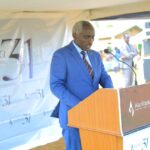By Elysée Muhizi
Illegal mining of mineral resources has destroyed infrastructure, including residents’ livelihoods, houses, Nyabarongo River water sources, and water tubes.
This story focuses on mining activities in the sectors of Nyamabuye and Rugendabari in Muhanga District (Southern Province) and Muhororo and Gatumba in Ngororero District (Western Province).
Some of the Impacts of Illegal Mining on Residents
Residents near a mineral mine in Kirebe Village, Gifumba Cell, Nyamabuye Sector, say those involved in illegal mining, known as “abahebyi,” damaged a water pipeline that supplied water to the city of Muhanga.

Habimana Philémon, a resident of Kirebe, stated that illegal miners destroyed a water tank that received water from the main pipeline and distributed it to the community.
“We know that mineral resources are valuable, but we ask the authorities to ensure that mining is done legally and responsibly.”

Mukandanga Josianne from Gifumba Village mentioned that security authorities tried to stop these miners, but they were unsuccessful.
“They damaged the water pipeline and the spring that supplied it, which is now also destroyed.”

Illegal mining also demolished a house in Mpinga Cell, Rugendabari Sector, Muhanga District. The affected resident now lives in harsh conditions as he struggles to afford rent and support his family.
The resident, named Kalisa in this article, shared: “The mine destroyed my house in July 2024. I am now renting, but paying rent is a challenge because I have no resources. I am not the only one; four other neighboring houses are also on the verge of collapsing due to illegal mining.”
Nkundabagenzi Védaste, a resident of Mpongo Village, Nsanga Cell, Rugendabari Sector, said his house started to crack from the bottom/foundation.
“At night, I send my three children to sleep with neighbors while my wife and I sleep in the damaged house. We do it to avoid dying together if the house collapses. We’re in a dilemma because the mine is only five meters from our home.”
Ruhungira Claude said that they reported the issue of their houses falling apart to local authorities, who came to assess the situation, but nothing was done afterward.
“We feel abandoned. When the miners are working and breaking rocks, our houses shake while we’re inside.”

What Do the Illegal Miners/Workers Say?
Nzayisenga Fabrice, an illegal miner in Ngororero district, but he’s from Rubavu District, who declined to be photographed, said they mine without permits due to economic hardship.
“We found an abandoned mine previously operated by a company. We know what we’re doing is illegal, but we need to survive and support our families. There is no other choice, because we’re poor.”
https://datawrapper.dwcdn.net/fauIW/1/
Authorities Respond
In an exclusive interview with UMUSEKE, Muhanga District Mayor, Madam Jacqueline Kayitare, acknowledged that illegal mining is a serious concern. She referred to the mine in Gifumba Cell, which has caused environmental and infrastructure damage.
In Gifumba, the mine destroyed the environment and infrastructure. We’ve arrested and prosecuted some offenders, and unfortunately, lives have been lost in some cases. But now, there are no mining activities in Gifumba.”

Regarding the destruction of homes in Rugendabari Sector, Mayor Kayitare said the district is following up on the matter.
“We will investigate. If we find that companies were responsible, even if they have since closed, they will be required to compensate the affected residents, including rebuilding their houses.”
She also confirmed that the damaged water pipeline in Gifumba Cell has been repaired.
“The water issue has been resolved. The pipeline was repaired and rerouted to pass through other areas, reaching Kabgayi. Residents who had lost access to water now have it again.”
More Damage in Ngororero District
In Gatumba Sector, Ngororero District, mining activities damaged two houses in Nyenyeri Village, Kamasiga Cell. However, those affected say they have yet to receive any compensation.
Mukasine Blandine, one of the two residents affected in 2023, said officials came to assess the situation and advised her to move because the mine was too close to her home.

Mukasine Blandine left her house because it was destroyed by illegal mining activities.
“They relocated me and ordered the mining company to pay me 20,000 RWF monthly for rent. They only paid for a short time and then stopped. I’m living in poverty, and thieves stole my crops because I now live far from my farmland. This has made it hard for me to afford health insurance.”
She added that a list of affected residents, including their names and the value of damages, was submitted to the Ngororero District two years ago, but no compensation has been given.
Dusabimana Thèogene, a resident of Nganzo Village, Rugogwe Cell, Muhororo Sector, said he had to move out because his house was at risk of collapsing.

“The district’s assessment showed 12 households had property damage, including houses, due to illegal mining. They told us we’d be paid for the damage within 15 days, but we are still waiting. We’re suffering because we can’t afford rent.”
Seven residents interviewed by UMUSEKE warned that continued rains could cause landslides under their homes, leading to destruction and displacement.
Ngororero District’s Position
Ngororero District Mayor Christophe Nkusi told UMUSEKE that when they learned a known company was responsible for damaging homes, they contacted the Rwanda Mines, Petroleum, and Gas Board (RMB) for verification.
“RMB confirmed that the company should rebuild houses for affected residents.”
He added that while some claims are valid, others are made by people living in high-risk zones who were not affected by mining.

“Those who genuinely lost houses due to illegal mining will have them rebuilt. Others living in hazardous areas are being resettled by the government.”
What Does the Rwanda Mines, Petroleum, and Gas Board Say?
Francis Kamanzi, Director General of RMB, stated that most infrastructure and property damage is caused by unlicensed miners.
“Each district has a dedicated mining inspector who works with local authorities to monitor mining activities. Offenders are punished according to mining regulations.”
Muhanga District has 19 mining companies; 15 are licensed, while 4 had their licenses revoked. Additionally, there are 19 quarrying companies extracting stones, sand, and clay.
In the Ngororero District, 18 mining companies operate. Only 9 are licensed; the remaining 9 were suspended due to non-compliance.
This story was produced with the support of Rwanda Environmental Journalists (REJ) and Fojo Media Institute.
End.











